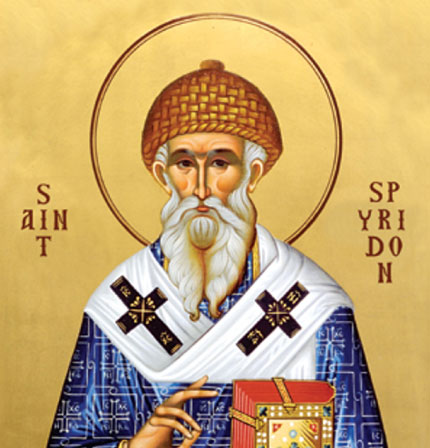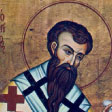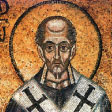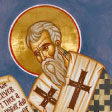Saint Spyridon

The Life and Ministry of Saint Spyridon of Tremithus
Saint Spyridon of Tremithus, one of the most beloved saints in the Orthodox Church, stands as a radiant example of humility, simplicity, and unwavering faith. Known for his deep connection to God and the miracles that adorned his life, Saint Spyridon remains a beacon of pastoral care and divine love. Though he lived in the 4th century, his life and ministry continue to inspire the faithful, drawing them closer to the heart of Christ.
Early Life and Humble Beginnings
Saint Spyridon was born around the year 270 AD in the small village of Assia, in Cyprus. Unlike many of the great hierarchs and theologians of his era, Spyridon was not a man of high education or noble birth. He was a shepherd by trade, tending his flocks with the same gentleness and love that he later extended to his flock as a bishop.
Spyridon married and lived a simple, pious life, deeply devoted to prayer and acts of charity. Even before his elevation to the episcopate, he was known for his hospitality, generosity to the poor, and his ability to heal the sick through his prayers. His heart, open to God, became a dwelling place of the Holy Spirit, and miracles began to manifest through him.
After the death of his wife, Spyridon embraced a more ascetic life, dedicating himself entirely to the service of the Church. The local Christian community, recognizing his holiness, appointed him Bishop of Tremithus (modern-day Tremetousia, Cyprus). His new role did not alter his humility; even as a bishop, he continued to work the land, care for the poor, and live with the simplicity that had characterized his earlier life.
Shepherd of Souls and Defender of the Faith
As a bishop, Saint Spyridon’s pastoral care extended beyond the spiritual needs of his flock. He cared for the material well-being of the people, ensuring that the poor were fed, the sick were tended to, and the downtrodden found refuge. His episcopacy mirrored the life of Christ, the Good Shepherd, who seeks out the lost sheep and lays down His life for the flock.
Spyridon’s reputation as a wonderworker grew, and many came to Tremithus seeking healing and consolation. He performed miracles not for personal recognition but as a natural outpouring of his deep communion with God. He healed the sick, cast out demons, and even raised the dead, embodying the living presence of Christ in the world.
During the reign of Emperor Maximian (late 3rd to early 4th century), Saint Spyridon endured persecution for his faith. He was arrested and tortured, yet his faith did not waver. After the Edict of Milan in 313 AD, which granted tolerance to Christians, he resumed his ministry with renewed vigor.
The First Ecumenical Council – Defender of Orthodoxy
One of the most significant moments in Saint Spyridon’s life occurred in 325 AD when he participated in the First Ecumenical Council of Nicaea, convened by Emperor Constantine. The Council addressed the Arian heresy, which denied the divinity of Christ, threatening the unity of the Church.
Though lacking formal theological education, Saint Spyridon stood as a formidable defender of the Nicene faith. His presence at the Council testified to the truth that the experience of God transcends intellectual learning. When called upon to explain the doctrine of the Holy Trinity, Spyridon used a powerful and simple demonstration. Holding a clay brick in his hand, he squeezed it, and to the astonishment of all present, fire rose from the top, water dripped from the bottom, and the clay remained in his hand. He proclaimed: "This brick is one, yet it consists of three elements – fire, water, and earth. Likewise, the Holy Trinity is one in essence, yet three in persons – Father, Son, and Holy Spirit."
This miraculous demonstration silenced the Arians and affirmed the Orthodox teaching on the Trinity. The simplicity and divine authority with which Saint Spyridon defended the faith became legendary, illustrating that holiness and wisdom are gifts of the Holy Spirit, not merely the result of academic study.
Miracles and Pastoral Ministry
Saint Spyridon’s life was adorned with numerous miracles that revealed his closeness to God and his compassion for humanity. One well-known account tells of a severe drought that struck Cyprus, leading to famine. The people, desperate for relief, came to Spyridon, who prayed fervently, and rain soon followed, saving the land from devastation.
On another occasion, a poor man approached Spyridon for help. With no money to offer, the saint prayed, and a serpent in the field was transformed into gold, which the man used to pay his debts. Afterward, when the man returned, Spyridon prayed again, and the gold turned back into a serpent, symbolizing that material wealth, while sometimes necessary, should not become a source of attachment.
One of the most touching stories involves a grieving mother who had lost her child. Saint Spyridon prayed over the child, and by God’s grace, the child was restored to life. Moved by the miracle, the mother died of joy. Spyridon then prayed once more, and she was also raised, illustrating the boundless mercy of God.
Falling Asleep in the Lord and Canonization
Saint Spyridon reposed in the Lord around the year 348 AD. His life was marked by humility, tireless service, and miraculous grace. After his repose, his relics became a source of healing and consolation, and his veneration spread rapidly throughout the Christian world.
His incorrupt relics, which continue to exude a sweet fragrance, are enshrined on the island of Corfu, where they are revered to this day. Every year, processions are held in his honor, and countless miracles are attributed to his intercessions. His feast day is celebrated on December 12, and he is recognized as the patron saint of Corfu, potters, and the poor.
Spiritual Legacy and Lessons for Today
The life of Saint Spyridon offers profound lessons for contemporary Christians. His simplicity reminds us that holiness is not found in grand achievements but in humble service and unwavering faith. In an age that often values intellect over experience, Saint Spyridon’s example shows that true wisdom is rooted in the heart’s encounter with God.
His compassion for the poor and afflicted calls us to imitate Christ’s love for the least of our brothers and sisters. Through his life, we see that miracles flow naturally from a heart attuned to God, and faith, when lived sincerely, can move mountains.
Saint Spyridon continues to be a living presence in the Church, interceding for the faithful and guiding them toward the Kingdom of Heaven. His life is a testament to the power of grace, the simplicity of faith, and the enduring love of the Good Shepherd, who calls each of us to follow Him with trust and humility.







